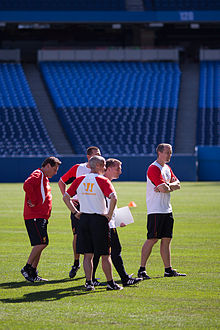Coaching staff


The coaching staff is a group of non-athletes tied to a sports team. A coaching staff can be existent at all levels of athletics. It is led by a head coach (known as a manager or senior coach in some sports), and consists of at least one assistant coach (usually two or more assistants), together with other members such as doctors, massage therapists, trainers, and equipment managers, fitness trainer, nutritionist, biomechanist, physiotherapist, etc. The members of the coaching staff are required to go through several trainings and courses to ensure reliability.
It has been suggested that when there is an upbeat and positive coaching staff with healthy relationships with the athletes, the outcome and experience of the team as a whole will benefit overall.[1] Although college athletes have the final say where they will be pursuing their academic and athletic careers, coaching staffs and facilities are more often than not are a deciding factor.[2]
See also
References
- ^ Magnusen, Marshall J (June 2010). "Differences in Strength and Conditioning Coach Self-Perception of Leadership Style Behaviors at the National Basketball Association, Division I-A, and Division II Levels". Journal of Strength and Conditioning Research. 24 (6): 1440–1450. doi:10.1519/JSC.0b013e3181d321ec.
- ^ Andrew, Damon P S; Martinez, J Michael; Flavell, Scott (2016). "Examining College Choice among NCAA Student-Athletes: An Exploration of Gender Differences". Journal of Contemporary Athletics. 10 (3): 201–214. S2CID 151377636. ProQuest 1864521136.
